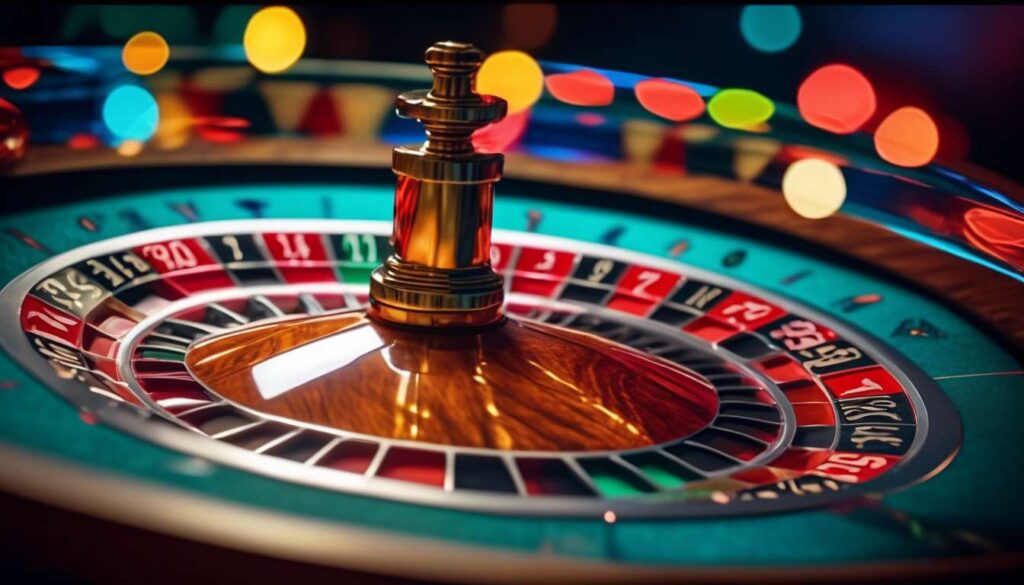As we embark on this exploration of the psychology of gambling, we find ourselves delving into a world where chance and choice intertwine. Together, we will navigate the intricate corridors of our minds, seeking to understand the impulses and decisions that compel us to place that next bet.
Gambling is not merely a game of luck; it is a complex interplay of cognitive biases, emotional responses, and social influences. By examining these psychological underpinnings, we aim to unravel the reasons why we are drawn to the thrill of uncertainty and the allure of potential rewards.
As we journey through this article, we will encounter the subtle ways in which our brains process:
- Risk
- Reward
- Regret
These processes shape our gambling behaviors. Let us set aside preconceived notions and immerse ourselves in the fascinating study of our decision-making processes within the realm of gambling.
Cognitive Biases in Gambling
When we gamble, cognitive biases often distort our judgment and lead us to make irrational decisions. We find ourselves caught in a web of mental shortcuts and misconceptions that push us towards risky bets.
These biases, like the illusion of control or the gambler’s fallacy, trick us into believing we can predict or control outcomes.
As a community seeking connection and excitement, we’re drawn to the rush of gambling. It’s not just the thrill; our brains release dopamine, a chemical that reinforces rewarding experiences, making us want to relive them.
Unfortunately, this dopamine surge can pave the way to addiction. We might start:
- Chasing losses, convinced our luck will change.
- Overestimating our abilities.
It’s a shared experience, binding us together yet pulling us deeper into the cycle.
Recognizing these cognitive biases isn’t just about individual awareness; it’s about understanding the collective human experience and supporting each other in making better choices.
Let’s navigate this complex landscape together.
Emotional Influences on Decisions
Emotions often drive our gambling decisions, leading us to take risks we might otherwise avoid. Together, we can recognize how our feelings shape our choices.
Dopamine and Emotional Highs:
- When we’re excited or stressed, dopamine floods our brains.
- This amplifies the thrill and overshadows our rational thought processes.
- The emotional high can blur our judgment, making us susceptible to cognitive biases like the illusion of control, where we believe we can influence random outcomes.
Social and Emotional Connections:
We all want to belong and feel connected, and sometimes gambling offers a shared emotional experience. Yet, these emotional pulls can lead us down the path of addiction, where gambling becomes less about enjoyment and more about chasing that next rush.
Acknowledging Emotional Triggers:
By recognizing our emotional triggers, we can better navigate these urges and make informed decisions.
Community Support:
Let’s stay aware of how our emotions and cognitive biases intertwine, influencing our gambling behaviors.
As a community, we can support each other in making choices that align with our values and well-being.
Social Factors and Gambling Choices
Our gambling choices are often shaped by social environments and relationships.
When surrounded by peers who gamble, we might feel compelled to join in, seeking a sense of belonging and shared excitement. These social interactions can influence our behavior, often pushing us to overlook cognitive biases that cloud our judgment. We might find ourselves making riskier bets because everyone else is doing it, driven by a desire to fit in rather than rational thought.
Moreover, the buzz of excitement when we’re together can enhance the release of dopamine in our brains. This heightens the thrill and reinforces the behavior. It’s easy to see how this could lead to addiction, as we chase that social high repeatedly.
By understanding these social factors, we can:
- Recognize when we’re being influenced by external pressures rather than our own informed choices.
- Make more balanced decisions in our gambling activities.
Together, we can foster healthier habits.
The Role of Dopamine in Risk-Taking
Our brain’s reward system plays a crucial part in why we take risks, with dopamine acting as a key neurotransmitter that drives this behavior.
When we gamble, our brains release dopamine, creating a surge of pleasure and excitement. This chemical reaction not only fuels our desire to win but can also lead us to overlook potential losses.
Cognitive biases can cloud our judgment when gambling:
- The "near-miss" effect might trick us into believing we’re close to winning.
- This encourages us to keep playing even when it’s not in our best interest.
Dopamine’s role in risk-taking is significant, but it also has a darker side. It can contribute to addiction, as our brains begin to crave that dopamine rush, leading to repetitive gambling behavior despite negative consequences.
Understanding this can help us make more informed decisions and support each other in our journey towards healthier habits.
Decision-Making Under Uncertainty
Navigating decisions in uncertain situations challenges our ability to weigh risks and rewards accurately. When we gamble, we’re often driven by the thrill of the unknown, but our brains aren’t always the best at processing uncertainty.
Cognitive Biases:
- Our decision-making can be clouded by cognitive biases.
- These biases lead us to overestimate our chances of winning or to chase losses.
- They can make us feel like we’re part of something bigger, a community of risk-takers, even when it doesn’t serve our best interests.
Role of Dopamine:
- Dopamine, a neurotransmitter associated with pleasure and reward, plays a crucial role.
- When we gamble, dopamine surges can create a false sense of certainty.
- This makes risky decisions feel justified and is a powerful motivator that keeps us engaged, even when the odds aren’t in our favor.
As we explore these decisions, let’s be mindful of the factors influencing our choices. This awareness can help us make more informed decisions and foster a sense of community in shared experiences.
Addiction and Gambling Behavior
Many of us have seen how gambling can transform from a simple pastime into a compulsive behavior that disrupts lives. We’re all in this together, trying to understand how addiction grips us and why some of us are more susceptible than others.
At the heart of gambling addiction lies the brain’s reward system, particularly the release of dopamine. This chemical makes us feel pleasure and reinforces behaviors, urging us to chase that elusive high again and again.
Our cognitive biases play a significant role too.
- We sometimes believe we’re due for a win after a series of losses.
- We may think we’re somehow luckier than others.
These beliefs can lead us down a dangerous path.
As a community, recognizing these patterns helps us support each other and seek healthier alternatives.
By understanding the interplay of dopamine and cognitive biases, we can:
- Foster a collective awareness.
- Create a supportive environment.
- Encourage rational decision-making over compulsive gambling behavior.
Rationality vs. Irrationality in Gambling
In gambling, we often find ourselves caught between rational decision-making and the allure of irrational beliefs and behaviors. We know the odds are stacked against us, yet cognitive biases, like the illusion of control or the gambler’s fallacy, can lead us astray. These biases trick us into believing we’re on the verge of a big win, even when logic suggests otherwise.
As a community, we understand the social pull of gambling, where stories of wins and losses bond us, and the thrill of the game offers a shared experience.
Dopamine plays a significant role in this dance between rationality and irrationality. Each near-miss or small win triggers a release of this feel-good neurotransmitter, reinforcing our behavior and sometimes nudging us closer to addiction.
While we’re all searching for that sense of belonging and excitement, it’s crucial to recognize when these elements of gambling may cloud our judgment.
Together, we can navigate these challenges and support each other in making informed decisions.
Strategies for Responsible Gambling
To gamble responsibly, we must set clear limits on time and money spent, ensuring we maintain control over our habits. By doing so, we’re not just protecting ourselves, but also embracing a sense of community among those who prioritize healthy gaming.
Let’s remember that cognitive biases can lead us to make irrational decisions, so it’s crucial to stay aware of these pitfalls. Our brains release dopamine when we gamble, creating a rush that can be addictive. This is why setting boundaries is essential.
Strategies for Responsible Gambling:
-
Set a Budget:
- Decide how much money you are willing to spend.
- Stick to this budget and avoid chasing losses.
-
Time Management:
- Set a specific time limit for gambling sessions.
- Take regular breaks to avoid prolonged play.
-
Self-awareness:
- Recognize the signs of compulsive behavior.
- Monitor emotions and avoid gambling when feeling upset or stressed.
Let’s support each other in recognizing the signs of compulsive behavior. Sharing our experiences and strategies helps us stay grounded, fostering a community that values responsible gambling.
Together, we can enjoy the excitement of gaming without losing sight of what’s truly important—our well-being and the connections we share.
Conclusion
In the world of gambling, your decisions are influenced by several factors:
-
Cognitive biases: These are systematic patterns of deviation from norm or rationality in judgment, which can affect your gambling decisions.
-
Emotions: Feelings such as excitement or frustration can heavily influence your choices.
-
Social factors: Peer pressure or the desire to fit in can impact your gambling behavior.
-
Dopamine: This brain chemical plays a significant role in the pleasure and reward system, often driving the urge to gamble.
Understanding the psychology behind your choices can help you make more informed decisions and practice responsible gambling.
By recognizing the factors at play and staying mindful of your behavior, you can navigate the uncertainties and risks associated with gambling with a greater sense of rationality and control.
Responsible gambling involves:
-
Making conscious choices.
-
Enjoying the experience responsibly.
Remember, the key is to balance enjoyment with mindfulness and control.

